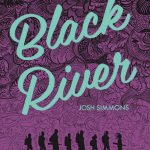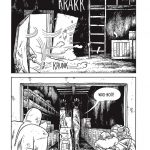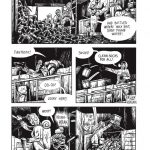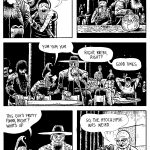Review: Black River by Josh Simmons
Author’s note: The contents of this review may be triggering due to discussion of both physical and sexual violence.
There’s been a “recent” uptick in post-apocalyptic
literature, from the resurgence of the zombie flick and revival of the Mad Max franchise to YA stories like The Hunger Games and The Maze Runner series. It seems that post-apocalyptic
stories echo the societal anxieties of the time in which they’re written, but most
of the stories that reach mainstream penetration focus on the action packed
adventures of people in peril. Very few get down to the bleak, day to day like
Josh Simmons’ latest full-length graphic novel Black River. In 112 pages of black and white comics, Simmons follows
a collection of women through the horrors of actually surviving in the
apocalypse.
Simmons’ story is a something of a trickster when it isn’t
being abjectly wretched. A windfall of food, booze, and supplies fall upon the
group at the beginning of the story, along with the promise of a long lost
paradise – a city with running water, electricity, and all the amenities of
modern life. But this setup lures the reader into something of a false sense of
security, because immediately thereafter, Simmons starts ratcheting up the
terror. A run-in with a crazed gang at a “comedy club” in a burned wasteland of
a town goes about as expected, but when the women are ambushed in the night by
a gang of cutthroat psychopathic men, the physical and sexual violence ramps
up. A revelation at the end of the book
calls into question the reader’s understanding of the whole comics’ chronology
and storytelling.
There’s a lot of moving pieces in this narrative, but a few
things stick out that I think are compelling. Simmons seems to be making
something of a statement against the violent nature of men. The men in Black River are all disgusting pigs,
minus one ill-fated man who starts out with the group of women. That women are the only rational actors in the
book is telling, although even they will kill with abandon if given the
opportunity. The sexual violence against these women is chilling and a
prevalent part of the narrative, and the most emotionally affecting. In one gut-wrenching scene, one of the women,
Suzie, who has recently been raped and returned to a pen where all the women
are being held after their abduction, grasps and pulls at her breasts, sobbing,
“I never wanted them. I never wanted these fucking things.”
Simmons seems to lavish attention on moments of physical
violence, whereas the sexual violence and rape is implied but never seen
(Simmons seems to imply that this horror is best left to the reader’s
imagination). Simmons will spend multiple panels setting up violent shots, only
to dwell on the gore, the dead, and the dying. This is surprising given the way
male violence is cast in Black River.
The effect is unnerving. Also unnerving are Simmons backgrounds; swirling and
ominous clouds follow the group across broken landscapes. These beautifully
rendered backdrops play host to relatively simple character design and
illustration. In some ways, these landscapes are an integral part of the mood
of the book, because they are so prevalent.
Black River,
unlike the many other post-apocalyptic stories, doesn’t give its reader the
satisfaction of a glimmer of hope. Nothing is going to get better. No one is going
to survive.
——–
Josh Simmons is a cartoonist whose previous full-length
graphic novel, House, was a 2007
Ignatz nominee. You can find more of Simmons’ work at jhscomics.
Fantagraphics is a publisher of alternative comics, manga,
and archival editions of historic comics. You can find more of their publishing
slate and catalog here.




